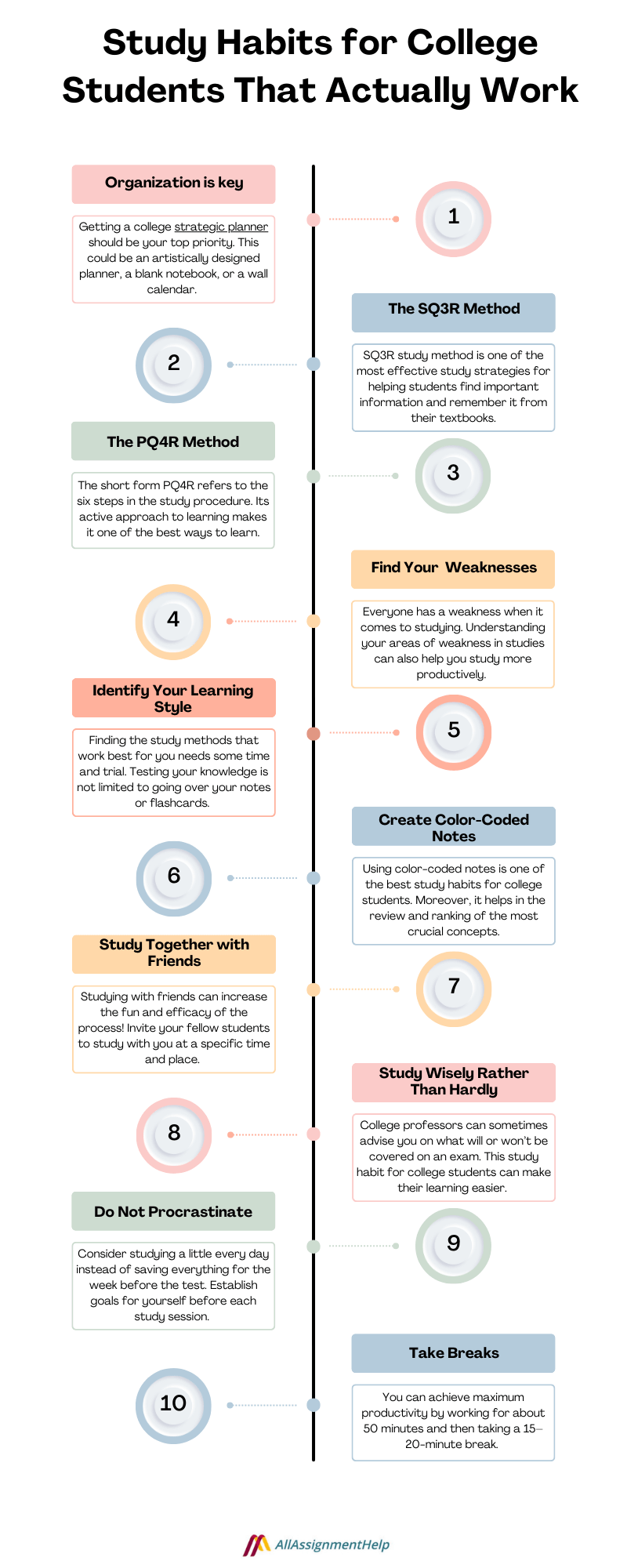Table of Contents
Attending college can be an exciting and transformative experience. You may be living alone for the first time but this is a great chance to meet new people, form friendships, and discover your interests on a personal and professional level. However, adjusting to college life can be very difficult, and creating a productive study timetable is no different! Studying can be challenging for college students. The good news is that there are some effective study habits for college students to increase the effectiveness, efficiency, and fulfillment of their studies.
Do you want to form productive study habits?
Read this blog presented by one of the experts at All Assignment Help that will help you to study smarter. These 10 study tips for college students assist in meeting deadlines, remembering lessons, and making the most of your time in college.
Study Habits for College Students That Actually Work
The academic environment in college will be unfamiliar and challenging for students who have just been admitted. It’s essential to start looking for methods to enhance your study habits to get ready for the demanding course load that lies ahead. While some students continue their study routines, others search on the Internet for “how to study effectively in college?”
Here are the 10 study habits for college students to follow:

Organization is Key
Getting a college strategic planner should be your top priority. This could be an artistically designed planner, a blank notebook, or a wall calendar. A wall calendar or desk calendar works best when it comes to verifying appointments, events, and deadlines. However, a notebook planner works best for on-the-go, wherever you are. Furthermore, if digital media is more convenient for you, you can sync it with nearly anything, including your computer, phone, and tablet. You can set up notifications for exam dates, departmental activities, study sessions, and assignment deadlines.
Read Here: Common Problems Faced By College Freshman
The SQ3R Method
SQ3R study method is one of the most effective study strategies for helping students find important information and remember it from their textbooks. The acronym SQ3R, also spelled QSR, stands for the five steps of the reading comprehension process. This study method includes the following:
- Survey: Make sure you quickly scan the text to gain an understanding of the primary concepts and themes before starting a new chapter.
- Question: Understand your reading with questions.
- Read: Search for the answers to the questions you posed as you read.
- Recite: Look into the questions you answered or the ones at the end of the chapter after you have finished reading.
- Review: After completing the chapter, go over the content again to make sure you understand it all.
The PQ4R Method
The short form PQ4R refers to the six steps in the study procedure. Its active approach to learning makes it one of the best ways to learn. You can increase your understanding and memorization of a subject by putting it into practice. Here is the breakdown of the PQ4R method:
- Preview: Take a quick look at the content to gain some context before you begin reading.
- Question: Consider some questions you may have about the subject, such as: What background knowledge do I have on this subject?
- Read: Go over each section of the material one at a time and look for the answers to the questions you have.
- Reflect: Have you discussed each question you had? If not, check back to see if you can figure out the solution.
- Recite: Give a summary of what you just read in your own words.
You can also get yourself an online assignment help service to get your assignment questions solved by a subject-matter expert.
Find Your Learning Weaknesses
Everyone has a weakness when it comes to studying. Understanding your areas of weakness in studies can also help you study more productively. Do you get sidetracked easily? Put your phone on silent or in a different room to avoid distractions, and then use it as a reward for concentrating on your studies. Do you tend to put things off? Make a schedule and follow it. Do you perform best in brief intervals? Check the Pomodoro technique and maintain the briefness of your study sessions. You can prepare yourself for success by understanding what goes wrong when you try to study.
Identify Your Learning Style
Finding the study methods that work best for you needs some time and trial. Testing your knowledge is not limited to going over your notes or flashcards. There are other methods as well. You can experiment with different strategies by using the metacognition process. Analyzing your cognitive processes is known as metacognition. It can assist you in determining which study techniques work best for you. Here are some steps to identify your learning process:
- Review what you already know and what you hope to learn about the subject before beginning to read a new chapter or watch a lecture.
- Make further notes about new information as you read or listen. Make a list of your questions as well.
- Next, attempt to put together what you have found and look for solutions to the remaining questions.
Create Color-Coded Notes
Using color-coded notes is one of the best study habits for college students. It’s a dynamic way to organize new information. Moreover, it helps in the review and ranking of the most crucial concepts. According to a 2019 study, color can enhance memory function. According to the same study, warm colors like red and yellow “can create a positive and motivating learning environment that can help learners not only to have a positive perception toward the content but also to engage and interact more with the learning materials” You can also use colorful markers and highlight the important area while making your notes.
Study Together with Friends
Studying with friends can increase the fun and efficacy of the process! Invite your fellow students to study with you at a specific time and place. For example, you can invite your biology classmates to spend an hour studying at the school cafeteria after class. This will also help you know about the biology assignment help services if you need one in the future. Furthermore, collaborating on your studies in person can help you hold each other responsible even if you are not in the same class.
Study Wisely Rather Than Hardly
College professors can sometimes advise you on what will or won’t be covered on an exam. You need to just pay attention to them! This study habit for college students can make their learning easier. They are providing this information to you to save you time and allow you to concentrate on the key points rather than spending hours studying irrelevant material. However, you can also write your professor a brief email to ask questions or have a talk with them after class if you are not sure what to concentrate on while you study.
Do Not Procrastinate
Although it’s easy to put off studying until the last minute. However, doing so will significantly reduce your chances of remembering what you have learned. It’s easier to form productive study habits when you pace yourself. Consider studying a little every day instead of saving everything for the week before the test. Establish goals for yourself before each study session. It is normal to take longer than expected to finish assignments. So, try not to be too hard on yourself if you don’t finish as much as you had planned. Make time for another study session and keep taking regular breaks.
Take Breaks
Intentional breaks have been connected to increases in energy, ability to concentrate, and retention. According to research, you can achieve maximum productivity by working for about 50 minutes and then taking a 15–20-minute break. Here are some strategies for taking care of yourself:
- Go for a quick walk
- Play some music that lifts your spirits
- Relax with a friend
- Meditate
- Have a shower
- Have a snack
- Tidy up your study space or area
It is also important to take breaks while learning online. Studying continuously can make you tired. This is sometimes unable you from taking your online class on your own. Thus, you should allow yourself enough time for rest, relaxation, and sleep so that your brain is recharged and ready to take in new information.
Also Read: Most Useful Websites for College Students in 2024
Final Thoughts!
These effective study habits for college students help them succeed in college by enhancing their capacity to efficiently organize and remember information.
Whatever your major, developing new study habits or improving existing ones is essential to succeeding as a college student. You will find these tips useful both weekly and during exam season. However, if you still feel the need for additional help with your exams, you can visit our website and ask, can you take my exam for me? We have the experts to help you perform the best in your college exams.
FAQs
| What is the 123 study method? The 123 method is easier to use: You learn your material on the first day. You review it on the second day. On the third day, give it another review. Then, put it out of your mind for a week. Then, you will go over it once more. |
| What is the key to studying? Spaced repetition is a technique for long-term retention that has been scientifically verified. Distribute your studying over several sessions as opposed to doing it all in one sitting. Over time, review and revisit the content more often and take longer pauses between reviews. |
| What exactly is the 15-30-15 study plan? This means that you should divide your language study sessions into three parts: fifteen minutes for morning review, thirty minutes for midday study, and fifteen more minutes for evening review. |
